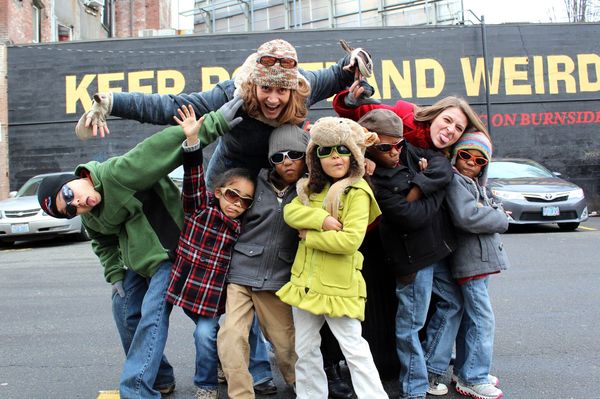Eye For Film >> Movies >> A Thread Of Deceit: The Hart Family Tragedy (2020) Film Review
A Thread Of Deceit: The Hart Family Tragedy
Reviewed by: Jennie Kermode

Sarah and Jennifer Hart lived quietly with their children in Woodland, in Washington state, for the last year of their lives. Although both had garnered some public attention in the past when campaigning on LGBT rights issues, and although their adopted son Devonte had briefly gone viral when he hugged a police officer during the Ferguson protests of 2014, they were not well known until, on the 26th of March 2018, they intentionally drove their SUV off a cliff in Mendocino County, California, with themselves and at least five of their six children inside.
What followed was just the kind of media reaction you might expect. Public distress at the deaths of the children made the case a sensation. Throw in the fact that it involved a same sex couple and interracial adoption, and that Devonte (whose body has never been found) had had that brief brush with fame, and it seemed to offer endless story potential. The media really went to town. Neighbours surfaced with allegations of abuse and neglect. Those who tried to adopt a more nuanced stance were threatened by members of the public, some receiving death threats. Jennifer's history of mental health problems was alternately sensationalised and erased. This caught the attention of filmmaker Rachel Morgan, who wanted to look behind the headlines to find out what really happened and to help viewers understand how the already shocking events were distorted.

This isn't an attempt to excuse what the Harts did. Rather, the focus is on looking at the known facts as plainly as possible and finding enough empathy for everyone involved to understand how things might have gone so horribly wrong. There's an impressive amount of testimony from friends and neighbours, some of whom tried to help the children and have been monstered since for not doing more. A blood relative of some of the children also weighs in, talking about how their birth mother lost them because of her addiction and hinting at some of the feelings that arose in retrospect about the fact she'd been told they'd be safer elsewhere.
Morgan doesn't probe deeply into the couple's past but she does establish that they withdrew more and more during that final year. She also notes that they received death threats following the Ferguson incident, and reflects on the impact of living with homophobic abuse for prolonged periods. There's a suggestion that the family grew as large as it did because they were overcompensating for the social difficulty presented by reactions to their sexuality, taking on lots of kids because it's what women are expected to want, because it helped them to fit in. Ordinary parental frustrations seem to have become overwhelming. Both had backgrounds in childcare but may not have understood how different it is when one can't leave it all behind at the end of the working day.
One thing they apparently did understand was social media. Morgan presents us with several happy family photographs that look staged, suggesting that the desire to cover up reality and maintain appearances started early on. Lots of families do this, however, even if they don't do it as well. Similarly, many children do tell lies and exaggerate and act out, especially if they've come from traumatic backgrounds. How realistic is it to expect friends and neighbours to have figured out how desperate the situation had become?
This film is only an hour long and there are several areas where it might have benefited from going into more depth, but it achieves the key task of striking a balance pretty well. Its depiction of the Harts as ordinary people whose lives went off the rails is ultimately far more disturbing than the simple narratives about evil offered by the popular media, and it's easy to see why many people might feel more comfortable with the latter. Though there's little attempt at this kind of contextualisation within the film itself, its mere existence highlights the difference between what we have all become used to and more traditional, socially conscious journalism. At a time when urgent questions are being asked about where clickbait culture has left us, it's a difference worth reflecting on.
Reviewed on: 10 Apr 2020















